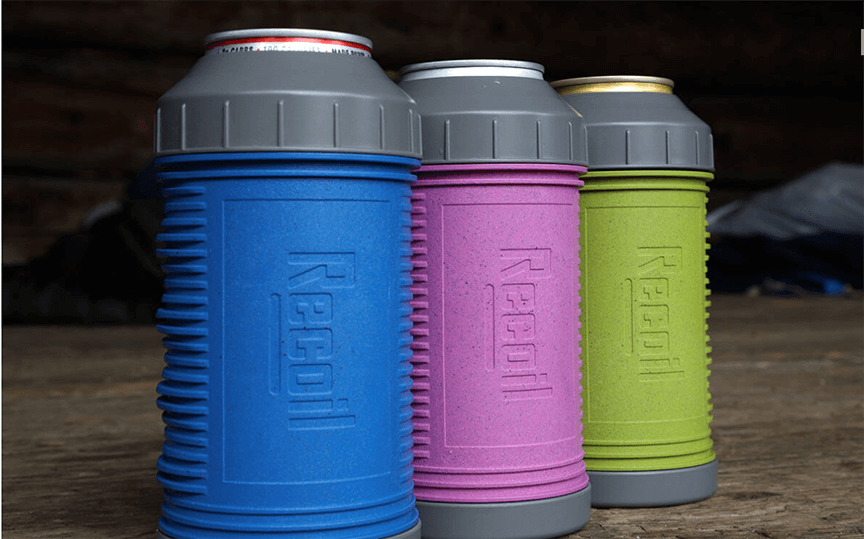Hemp, Sustainability
Top 3 Unexpected Facts About Hemp Plastics
On our mission to advocate for our planet and a natural approach to wellness, we will be bringing awareness to systems and products that can help to address the damage that has occurred in our environment. This month, we’ll be focusing on hemp plastics, how they are made, and some unexpected facts that show the versatility and benefits of a material made from hemp.
Plastic from fossil fuel was invented over a century ago and quickly gave rise to life-saving inventions in medicine, travel, safety, and more. It revolutionized our world and even led to fuel savings and pollution mitigation. However, plastics production quickly evolved into a source of convenience and the world adopted single-use plastics for everyday consumables like plastic bottles, bags, and food wrappers. Today, plastic is often taken for granted, and with a pandemic forcing us to work and play from home, we are also ordering meals delivered more frequently which means even more plastic production in take-away food containers, bags, and utensils. While there is a percentage of restaurants utilizing alternative eco-friendly products made from wood, hemp, and cardboard, plastic is still the most popular commercial choice on a global scale.
“Today, single-use plastics account for 40 percent of the plastic produced every year”.
National Geographic
National Geo also captured these facts that point to why we are where we are:
- Production increased exponentially, from 2.3 million tons in 1950 to 448 million tons by 2015. Production is expected to double by 2050.
- Every year, about 8 million tons of plastic waste escapes into the oceans from coastal nations. That’s the equivalent of setting five garbage bags full of trash on every foot of coastline around the world.
- Plastics often contain additives making them stronger, more flexible, and durable. But many of these additives can extend the life of products if they become litter, with some estimates ranging to at least 400 years to break down.
While the user lifecycle of a single-use wrapper or plastic bottle is hours to minutes, it can take hundreds of years to break down in the environment and often ends up in waterways and oceans and other ecosystems. The effects of plastic can be long-lasting, and the harm to our environment impacts the smallest to the largest animals in our food chain. Plastic pollution has become so overwhelming that a global treaty committed to the problem is currently being negotiated by the United Nations.
The facts are staggering but there are ways to shift from our dependence on it and those in the hemp manufacturing community are already working on solutions. One man, in particular, has made it part of his life’s mission to help solve the world’s plastic crisis. Paul Benhaim has been working with hemp production since 1993. His knowledge is vast, and he has translated it into the development of many companies including wellness, food, and fiber but it’s hemp plastics that has recently held his interest and he is confident that the product will make a difference.
Success came when Benhaim discovered that a hemp composite material would work with existing petroleum-based plastic machinery and injection molding. What it meant was that most plastic items can be produced with hemp composite materials. Additionally, it can be zero waste if using the hemp waste from any hemp processing including food, furniture or fiber. Typically, hemp waste is used for animal feed so it is revolutionary to think it can be used to produce plastic products. Hemp along with bamboo and other eco-friendly materials could lead to a plastic-free future.
Top 3 unexpected facts about Hemp and Hemp-based Products
1. Hemp and hemp products are non-toxic.
While plastics contribute to hazards in our oceans, waterway, and other ecosystems, the production of plastics also originate as fossil fuels and emit greenhouse gases as well as the chemical BPA that is harmful to human health.
It’s estimated that 93 percent of Americans over the age of six tests positive for BPA, a chemical in plastic linked to cancer, diabetes, impaired immunity, and much more.
NIH (National Institute of Health Sciences)
Hemp-based plastic is non-toxic and does not release harmful toxins into the air and environment. Hemp plastics are 100% biodegradable and are non-toxic if consumed by wildlife and sea life. Plastic manufactured from hemp doesn’t contain harmful toxins that petroleum-based plastics production has been knowns to cause resulting in birth defects, learning disabilities, and cancers.
2. Hemp plastics decrease environmental pollutants and are 100% biodegradable.
Unlike petroleum-based plastics, hemp production does not release harmful chemicals into the air and the products do not leak harmful BPA toxins into the environment. While burning fossil fuels contribute to the rise in CO2 emissions, hemp-based products absorb CO2 and convert it into oxygen. Hemp plastic produces no toxic chemicals and hemp waste from any kind of production can be used again creating a zero-waste production process.
Biodegradable hemp plastic is made with 100% biodegradable polymers that can be recycled indefinitely and take only 3-6 months to break down vs. the hundreds of years it takes conventional plastic to decompose.
3. Hemp plastics are stronger than petroleum-based plastics and can be used to produce any product traditional plastic can produce.
As Paul Benhaim discovered early on, hemp composite material will work with existing petroleum-based plastic machinery and injection molding. That means hemp composite material can be used to produce bottles, bags, food containers, toys, electronics, furniture, and more. Hemp can be used to make anything that is currently manufactured with traditional plastics. And because it is stronger (five times stiffer and 3.5 stronger), it is also safer particularly for products like car parts, boats, architectural components, and medical equipment.
What it all says is the there is more to hemp than reducing the carbon footprint. Hemp plastic production is practical and profitable for business. Most importantly, it is better for the health of our planet and the population that depends on it to survive.
New Technologies Drive Plant-based Innovations
As we continue to push technology and develop plant-based products to replace plastics, we can look forward with optimism that the damage done can be address and, in some cases, reversed. Kaya Hemp Co. proudly partners with The Hemp Plastic Company to provide Recoil products which are made using hemp that is 100% grown and processed in the U.S. We are also proud of a local Phoenix company that is going above and beyond to address the plastics issue. Footprint is creating solutions for a healthier planet with technologies that are unmatched in the fiber industry. Footprint products are designed to customer needs and can be designed to be recyclable and compostable.
Kaya Hemp Co. will continue to bring awareness to these products and systems while highlighting the companies that are changing the way the world relies on plastics. From cultivators to makers & artisans, we are committed to supporting industries that can make a significant impact in our world through sustainable practices and conscious choices.
For more on our eco-friendly products (kitchen & garden, bath & body, baby & kids, pets, and books), visit our store in person or check us out online.
“Conscious Goods for Conscious People”
Resources:

